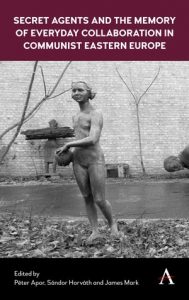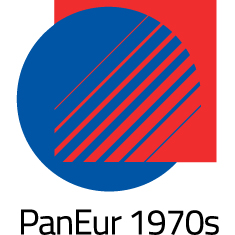Secret Agents and the Memory of Everyday Collaboration in Communist Eastern Europe
Posted on 17 October, 2017 in1989 Area Studies Communism Eastern Europe End of Yugoslavia GDR Hungary Memory Post Socialism Rethinking 1989 Romania

 Professor James Mark’s co-edited volume Secret Agents and the Memory of Everyday Collaboration in Communist Eastern Europe is now available through Anthem Press.
Professor James Mark’s co-edited volume Secret Agents and the Memory of Everyday Collaboration in Communist Eastern Europe is now available through Anthem Press.
This collection of essays addresses institutions that develop the concept of collaboration, and examines the function, social representation and history of secret police archives and institutes of national memory that create these histories of collaboration. The essays provide a comparative account of collaboration/participation across differing categories of collaborators and different social milieux throughout East-Central Europe. They also demonstrate how secret police files can be used to produce more subtle social and cultural histories of the socialist dictatorships. By interrogating the ways in which post-socialist cultures produce the idea of, and knowledge about, “collaborators,” the contributing authors provide a nuanced historical conception of “collaboration,” expanding the concept toward broader frameworks of cooperation and political participation to facilitate a better understanding of Eastern European communist regimes.
 Edited by Péter Apor, Sándor Horváth and James Mark, the essays are framed into three parts – Institutes, Secret Lives and Collaborating Communities and include topics such as the Stasi Records of the former GDR; memory in Latvia, Slovak and the Czech Republics; Tito and intellectuals 1945-80; entangled stories with the Former Securitate; Regional-level Party Activists in Slovakia and priest collaboration in Slovak Catholic memory after 1989.
Edited by Péter Apor, Sándor Horváth and James Mark, the essays are framed into three parts – Institutes, Secret Lives and Collaborating Communities and include topics such as the Stasi Records of the former GDR; memory in Latvia, Slovak and the Czech Republics; Tito and intellectuals 1945-80; entangled stories with the Former Securitate; Regional-level Party Activists in Slovakia and priest collaboration in Slovak Catholic memory after 1989.
“This excellent volume marks a genuine breakthrough in our knowledge about the everyday lives of the people who made up the secret police, of their motivations and their experiences. It challenges binary visions of the past and powerfully highlights the complexity of the term ‘collaboration.’ Ultimately, it makes a case for the human factor in the history of the repressive state.”
Ulf Brunnbauer, Director, Leibniz Institute for East and Southeast European Studies, Regensburg, Germany
Table of Contents
Frameworks: Collaboration, Cooperation, Political Participation in the Communist Regimes
(The Editors)
Part 1: Institutes
Chapter 1: A Dissident Legacy, The ‘Federal Commissioner for the Stasi Records of the Former GDR’ (BStU) in United Germany
(Bernd Schaefer)
Chapter 2: In Black and White? The Discourse on Polish Post-War Society by the Institute of Polish Remembrance
(Barbara Klich-Kluczewska)
Chapter 3: The Exempt Nation: Memory of Collaborationism in Contemporary Latvia
(Leva Zake)
Chapter 4: Institutes of Memory in the Slovak and Czech Republics – What Kind of Memory?
(Martin Kovanič)
Chapter 5: Closing the Past – Opening the Future. Hungarian Victims and Perpetrators of the Communist Regime
(Péter Apor and Sándor Horváth)
Chapter 6: To Collaborate and to Punish. Democracy and Transitional Justice in Romania
(Florin Abraham)
Part 2: Secret Lives
Chapter 7: ‘Resistance through Culture’ or ‘Connivance through Culture.’ Difficulties of Interpretation; Nuances, Errors, and Manipulations
(Gabriel Andreescu)
Chapter 8: Intellectuals between Collaboration and Independence. Politics and Everyday Life in the Prague Faculty of Arts in Late Socialism
(Matěj Spurný)
Chapter 9: Tito and Intellectuals – Collaboration and Support, 1945–1980
(Josip Mihaljević)
Chapter 10: Spy in the Underground. Polish Samizdat Stories
(Paweł Sowiński)
Chapter 11: Entangled Stories. On the Meaning of Collaboration with the Former Securitate
(Cristina Petrescu)
Part 3: Collaborating Communities
Chapter 12: Finding the Ways (around). Regional-level Party Activists in Slovakia
(Marína Zavacká)
Chapter 13: ‘But Who is the Party?’ History and Historiography in the Hungarian Communist Party
(Tamás Kende)
Chapter 14: Forgetting ‘Judas’. Priest Collaboration in Slovak Catholic Memory after 1989
(Agáta Drelová)
Chapter 15: Informing as Life-Style. Unofficial Collaborators of the Hungarian and the East-German State Security (Stasi) Working in the Tourism Sector
(Krisztina Slachta)
→ Order your copy through the Anthem Press website: Secret Agents and the Memory of Everyday Collaboration in Communist Eastern Europe
Post-Doctoral Positions with PanEur1970s at the European University Institute
Posted on 3 May, 2016 inEastern Europe GDR Post Socialism Socialism

Two Research Associate positions are currently available with the PanEur1970s – Looking West: the European Socialist regimes facing pan-European cooperation and the European Community, based at the European University Institute. This five year project is investigating the European Socialist regimes’ expectations and predicaments vis-à-vis the opening of a space of pan-European cooperation in the long 1970s.
Research Associate Vacancy: GDR and European cooperation in the 1970s (24 months)
Applications are now open for a research associate to study these debates in the German Democratic Republic (East Germany) by exploring and analysing archival as well as published sources.
More specifically, s/he will do research on East Germany’s socialist elites’ views, policies, and ideas on the processes of European cooperation and integration in the 1970s.
The position will be for 24 months, starting from October 2016.
The appointed candidate will receive a monthly net salary of approximately 2500 EUR depending on qualifications and allowances (household allowance, expatriation allowance, travel allowance, medical insurance, and dependents’ allowances, if applicable).
Funding for research missions and participation to international conferences will also be provided.
The candidate will have a PhD in History (preferably international or economic history) or in a closely related discipline, as well as research experience on GDR’s archival records.
S/he will be fluent in German and have good command of English.
Knowledge of other European languages may constitute an advantage but is not required.
Research Associate Vacancy: Bulgaria and European cooperation in the 1970s (24 months)
Applications are now open for a Research Associate to study these debates in Bulgaria by exploring and analysing archival as well as published sources.
More specifically, s/he will do research on Bulgaria’s socialist elites’ views, policies, and ideas on the processes of European cooperation and integration in the 1970s.
The position will be for 24 months, starting from October 2016.
The appointed candidate will receive a monthly net salary of approximately 2500 EUR depending on qualifications and allowances (household allowance, expatriation allowance, travel allowance, medical insurance, and dependents’ allowances, if applicable).
Funding for research missions and participation to international conferences will also be provided.
The candidate will have a PhD in History (preferably international or economic history) or in a closely related discipline, as well as research experience on Bulgaria’s archival records.
S/he will be fluent in Bulgarian and have good command of English.
Knowledge of other European languages may constitute an advantage but is not required.
The deadline to submit applications for both posts is 31 May 2016.
More information and details of how to apply can be found on the PanEur1970s website:
GDR and European cooperation post
Bulgaria and European cooperation post
[Top]




